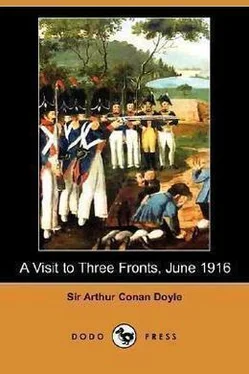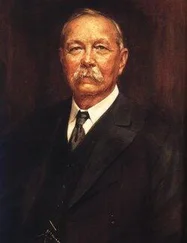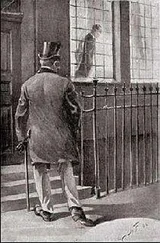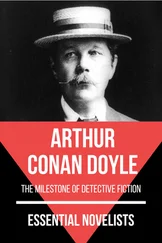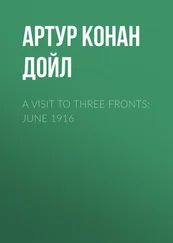Arthur Doyle - A Visit to Three Fronts
Здесь есть возможность читать онлайн «Arthur Doyle - A Visit to Three Fronts» весь текст электронной книги совершенно бесплатно (целиком полную версию без сокращений). В некоторых случаях можно слушать аудио, скачать через торрент в формате fb2 и присутствует краткое содержание. Год выпуска: 2014, Издательство: epubBooks Classics, Жанр: Биографии и Мемуары, Публицистика, prose_military, на английском языке. Описание произведения, (предисловие) а так же отзывы посетителей доступны на портале библиотеки ЛибКат.
- Название:A Visit to Three Fronts
- Автор:
- Издательство:epubBooks Classics
- Жанр:
- Год:2014
- ISBN:нет данных
- Рейтинг книги:3 / 5. Голосов: 1
-
Избранное:Добавить в избранное
- Отзывы:
-
Ваша оценка:
- 60
- 1
- 2
- 3
- 4
- 5
A Visit to Three Fronts: краткое содержание, описание и аннотация
Предлагаем к чтению аннотацию, описание, краткое содержание или предисловие (зависит от того, что написал сам автор книги «A Visit to Three Fronts»). Если вы не нашли необходимую информацию о книге — напишите в комментариях, мы постараемся отыскать её.
A Visit to Three Fronts — читать онлайн бесплатно полную книгу (весь текст) целиком
Ниже представлен текст книги, разбитый по страницам. Система сохранения места последней прочитанной страницы, позволяет с удобством читать онлайн бесплатно книгу «A Visit to Three Fronts», без необходимости каждый раз заново искать на чём Вы остановились. Поставьте закладку, и сможете в любой момент перейти на страницу, на которой закончили чтение.
Интервал:
Закладка:
There is a large field on our left rear, and the German gunners have the idea that there is a concealed battery therein. They are systematically searching for it. A great shell explodes in the top corner, but gets nothing more solid than a few tons of clay. You can read the mind of Gunner Fritz. 'Try the lower corner!' says he, and up goes the earth–cloud once again. 'Perhaps it's hid about the middle. I'll try.' Earth again, and nothing more. 'I believe I was right the first time after all,' says hopeful Fritz. So another shell comes into the top corner. The field is as full of pits as a Gruyère cheese, but Fritz gets nothing by his perseverance. Perhaps there never was a battery there at all. One effect he obviously did attain. He made several other British batteries exceedingly angry. 'Stop that tickling, Fritz!' was the burden of their cry. Where they were we could no more see than Fritz could, but their constant work was very clear along the German line. We appeared to be using more shrapnel and the Germans more high explosives, but that may have been just the chance of the day. The Vimy Ridge was on our right, and before us was the old French position, with the labyrinth of terrible memories and the long hill of Lorette. When, last year, the French, in a three weeks' battle, fought their way up that hill, it was an exhibition of sustained courage which even their military annals can seldom have beaten.
And so I turn from the British line. Another and more distant task lies before me. I come away with the deep sense of the difficult task which lies before the Army, but with a deeper one of the ability of these men to do all that soldiers can ever be asked to perform. Let the guns clear the way for the infantry, and the rest will follow. It all lies with the guns. But the guns, in turn, depend upon our splendid workers at home, who, men and women, are doing so grandly. Let them not be judged by a tiny minority, who are given, perhaps, too much attention in our journals. We have all made sacrifices in the war, but when the full story comes to be told, perhaps the greatest sacrifice of all is that which Labour made when, with a sigh, she laid aside that which it had taken so many weary years to build.
A Glimpse of the Italian Army
One meets with such extreme kindness and consideration among the Italians that there is a real danger lest one's personal feeling of obligation should warp one's judgment or hamper one's expression. Making every possible allowance for this, I come away from them, after a very wide if superficial view of all that they are doing, with a deep feeling of admiration and a conviction that no army in the world could have made a braver attempt to advance under conditions of extraordinary difficulty.
First a word as to the Italian soldier. He is a type by himself which differs from the earnest solidarity of the new French army, and from the businesslike alertness of the Briton, and yet has a very special dash and fire of its own, covered over by a very pleasing and unassuming manner. London has not yet forgotten Durando of Marathon fame. He was just such another easy smiling youth as I now see everywhere around me. Yet there came a day when a hundred thousand Londoners hung upon his every movement—when strong men gasped and women wept at his invincible but unavailing spirit. When he had fallen senseless in that historic race on the very threshold of his goal, so high was the determination within him, that while he floundered on the track like a broken–backed horse, with the senses gone out of him, his legs still continued to drum upon the cinder path. Then when by pure will power he staggered to his feet and drove his dazed body across the line, it was an exhibition of pluck which put the little sunburned baker straightway among London's heroes. Durando's spirit is alive to–day, I see thousands of him all around me. A thousand such, led by a few young gentlemen of the type who occasionally give us object lessons in how to ride at Olympia, make no mean battalion. It has been a war of most desperate ventures, but never once has there been a lack of volunteers. The Tyrolese are good men—too good to be fighting in so rotten a cause. But from first to last the Alpini have had the ascendency in the hill fighting, as the line regiments have against the Kaiserlics upon the plain. Caesar told how the big Germans used to laugh at his little men until they had been at handgrips with them. The Austrians could tell the same tale. The spirit in the ranks is something marvellous. There have been occasions when every officer has fallen and yet the men have pushed on, have taken a position and then waited for official directions.
But if that is so, you will ask, why is it that they have not made more impression upon the enemy's position? The answer lies in the strategical position of Italy, and it can be discussed without any technicalities. A child could understand it. The Alps form such a bar across the north that there are only two points where serious operations are possible. One is the Trentino Salient where Austria can always threaten and invade Italy. She lies in the mountains with the plains beneath her. She can always invade the plain, but the Italians cannot seriously invade the mountains, since the passes would only lead to other mountains beyond. Therefore their only possible policy is to hold the Austrians back. This they have most successfully done, and though the Austrians with the aid of a shattering heavy artillery have recently made some advance, it is perfectly certain that they can never really carry out any serious invasion. The Italians then have done all that could be done in this quarter. There remains the other front, the opening by the sea. Here the Italians had a chance to advance over a front of plain bounded by a river with hills beyond. They cleared the plain, they crossed the river, they fought a battle very like our own battle of the Aisne upon the slopes of the hills, taking 20,000 Austrian prisoners, and now they are faced by barbed wire, machine guns, cemented trenches, and every other device which has held them as it has held every one else. But remember what they have done for the common cause and be grateful for it. They have in a year occupied some forty Austrian divisions, and relieved our Russian allies to that very appreciable extent. They have killed or wounded a quarter of a million, taken 40,000, and drawn to themselves a large portion of the artillery. That is their record up to date. As to the future it is very easy to prophesy. They will continue to absorb large enemy armies. Neither side can advance far as matters stand. But if the Russians advance and Austria has to draw her men to the East, there will be a tiger spring for Trieste. If manhood can break the line, then I believe the Durandos will do it.
'Trieste o morte!' I saw chalked upon the walls all over North Italy. That is the Italian objective.
And they are excellently led. Cadorna is an old Roman, a man cast in the big simple mould of antiquity, frugal in his tastes, clear in his aims, with no thought outside his duty. Every one loves and trusts him. Porro, the Chief of the Staff, who was good enough to explain the strategical position to me, struck me as a man of great clearness of vision, middle–sized, straight as a dart, with an eagle face grained and coloured like an old walnut. The whole of the staff work is, as experts assure me, moot excellently done.
So much for the general situation. Let me descend for a moment to my own trivial adventures since leaving the British front. Of France I hope to say more in the future, and so I will pass at a bound to Padua, where it appeared that the Austrian front had politely advanced to meet me, for I was wakened betimes in the morning by the dropping of bombs, the rattle of anti–aircraft guns, and the distant rat–tat–tat of a maxim high up in the air. I heard when I came down later that the intruder had been driven away and that little damage had been done. The work of the Austrian aeroplanes is, however, very aggressive behind the Italian lines, for they have the great advantage that a row of fine cities lies at their mercy, while the Italians can do nothing without injuring their own kith and kin across the border. This dropping of explosives on the chance of hitting one soldier among fifty victims seems to me the most monstrous development of the whole war, and the one which should be most sternly repressed in future international legislation—if such a thing as international law still exists. The Italian headquarter town, which I will call Nemini, was a particular victim of these murderous attacks. I speak with some feeling, as not only was the ceiling of my bedroom shattered some days before my arrival, but a greasy patch with some black shreds upon it was still visible above my window which represented part of the remains of an unfortunate workman, who had been blown to pieces immediately in front of the house. The air defence is very skilfully managed however, and the Italians have the matter well in hand.
Читать дальшеИнтервал:
Закладка:
Похожие книги на «A Visit to Three Fronts»
Представляем Вашему вниманию похожие книги на «A Visit to Three Fronts» списком для выбора. Мы отобрали схожую по названию и смыслу литературу в надежде предоставить читателям больше вариантов отыскать новые, интересные, ещё непрочитанные произведения.
Обсуждение, отзывы о книге «A Visit to Three Fronts» и просто собственные мнения читателей. Оставьте ваши комментарии, напишите, что Вы думаете о произведении, его смысле или главных героях. Укажите что конкретно понравилось, а что нет, и почему Вы так считаете.
